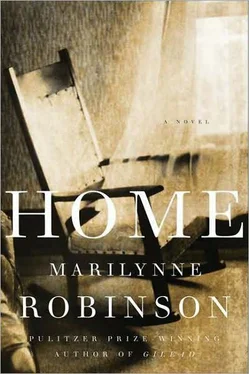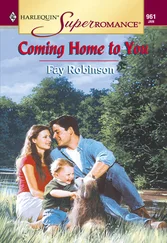When he sat on the porch in the afternoons she worked in the garden. Those hours passed pleasantly. She cleared out patches she could break up well enough to plant with peas and lettuce.
But oh, the evenings were long. I am thirty-eight years old, she would say to herself, as she tidied up after supper. I have a master’s degree. I taught high school English for thirteen years. I was a good teacher. What have I done with my life? What has become of it? It is as if I had a dream of adult life and woke up from it, still here in my parents’ house. Of course plain, respectable dresses hung in her closet, suitable for the classroom. There were the cardigans and low-heeled shoes of that other life. No reason not to wear them.
She dreamed sometimes that she was back in school. She was a child pretending to teach, or a teacher who realized to her embarrassment that she was turning into a child. In both dreams she had no idea what she was talking about and invented desperately. She sensed smirking and resentment in the room, murmurs and odd looks. The students would all walk out, ignoring her, and there was nothing to say to them to make them stay. Such humiliation! She would shout over the laughter and the clash of locker doors and wake herself up in crickety, black Gilead. Better in its way than waking up in Des Moines, knowing she would be in her classroom again when morning came. Her dreams reminded her that she did not altogether love teaching, though by daylight she thought she did. That stab in the heart she felt when she woke, and the panicky doubt that her life was in her grasp, not fraud or failure, not entirely — that was a brief misery and one she could set aside by putting the light on and reading for a while. She used to ask herself, What more could I wish? But she always distrusted that question, because she knew there were limits to her experience that precluded her knowing what there was to be wished.
If she had been a man she might have chosen the ministry. That would have pleased her father. Luke had followed him, but only after it became clear that Dan would not. Jack was by then Jack, and Teddy was too young to shoulder anyone’s hopes, however willingly he might have made the attempt. She seemed always to have known that, to their father’s mind, the world’s great work was the business of men, of gentle, serious men well versed in Scripture and eloquent at prayer, or, in any case, ordained in some reasonably respectable denomination. They were the stewards of ultimate things. Women were creatures of a second rank, however pious, however beloved, however honored. This was not a thing her father would ever have said to her. It was Hope who told her that clergy were only and always men, excepting Aimee Semple McPherson, who proved the rule. But she knew how things were before she was told. No bright child could fail to know. None of this had mattered much through all the years of her studies and her teaching, but now, in the middle of any night, it was part of the loneliness she felt, as if the sense that everything could have been otherwise were a palpable darkness. Darkness visible. That was Milton.
Those grown children had, almost all of them, bent their heads over whatever work she gave them, even though their bodies were awkward and restless with the onset of adulthood, fate creeping through their veins and glands and follicles like a subtle poison, making them images of their parents and strangers to themselves. There was humor in it of a kind that might raise questions about the humorist.
Why do we have to read poetry? Why “Il Penseroso”? Read it and you’ll know why. If you still don’t know, read it again. And again. Some of them took the things she said to heart, as she had done once when they were said to her. She was helping them assume their humanity. People have always made poetry, she told them. Trust that it will matter to you. The pompous clatter of “The Charge of the Light Brigade” moved some of them to tears, and then she had talked to them about bad poetry. Who gets to say what’s good and what’s bad? I do, she said. For the moment. You don’t have to agree, but listen. Some of them did listen. This seemed to her to be perfectly miraculous. No wonder she dreamed at night that she had lost any claim to their attention. What claim did she have? Could it be that certain of them lifted their faces to her so credulously because what she told them was true, that they were human beings, keepers of lore, makers of it? That it was really they who made demands of her? Her father taught his children, never doubting, that there was a single path from antiquity to eternity. Learn the psalms and ponder the ways of the early church. Know what must be known. Ancient fathers taught their ancient children, who taught their ancient children, these very things. Puritan Milton with his pagan muses. It is like a voice heard from another room, singing for the pleasure of the song, and then you know it, too, and through you it moves by accident and necessity down generations. Then, why singing? Why pleasure in it? And why the blessing of the moment when another voice is heard, dreaming to itself? That was her father humming “Old Hundred” while he shaved. It was John Keats in Cheapside, traveling his realms of gold. No need to be a minister. To be a teacher was an excellent thing. Those vacant looks might be inwardness. The young might have been restless around any primal fire where an elder was saying, Know this. Certainly they would have been restless. Their bodies were consumed with the business of lengthening limbs, sprouting hair, fitting themselves for procreation. Even so, sometimes she felt a silence in the room deeper than ordinary silence. How could she have abandoned that life? For what had she abandoned it?
Her supposed former fiancé of so many years had told her in a letter that he knew to the penny how much he owed her. He had kept some sort of ledger. He must have kept it from the very beginning, from the time he took her to dinner and then realized he had forgotten his wallet. She blushed when she thought of it. He said he would pay it all back to the last penny, as soon as his situation began to improve. He said, “It will take some time to repay you in full, since the total is quite large.” What horrible, vindictive little streak of honesty had moved him to keep a record of these “debts”? She had not kept anything like an account, had never thought of such a thing, had never even felt she was giving anything away. None of it mattered now. To have been such a fool mattered. In that letter he had said, “I am sorry if I seem to have misled you.” She could not let herself remember the lonely pleasures she found in living so simply, actually enjoying the renunciations and the economies that would some time make possible — what? — ordinary happiness. The kind of happiness she saw in the luncheonette, passed in the street.
She knew there had to be Shakespeare and Dickens around the house, Mark Twain had to be somewhere. Kipling was on the dresser in Luke and Teddy’s room, as he always was, but she hated Kipling. Finally she asked her father what had become of the books she liked to read; he made a phone call, and within two weeks six boxes arrived from six addresses, full of the good old books and with some sober and respectable new novels included, too, Andersonville, The High and the Mighty, Something of Value . She put ten of them in a stack beside the radio. At this time she could decide nothing about her life. She did not want to think about her life. She opened Andersonville . Her father told her, “The fellow that wrote that is from Iowa. I forget what town. He’s famous now. I forget his name.” She knew about MacKinley Kantor of Webster City. Andersonville was long and notoriously sad. It had broken the heart of greater Des Moines. She decided she would read it to the end. She could weep without upsetting her father.
Читать дальше












